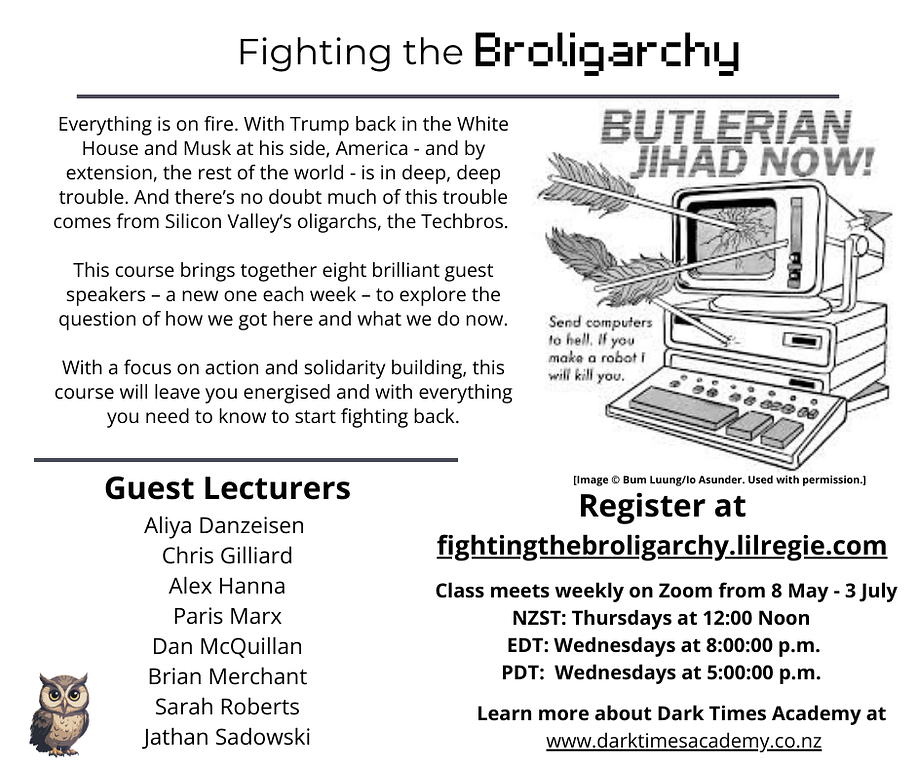Fighting the Broligarchy!
Thu 8 May 2025 NZST

Check out the course webpage for more details!
Your Facilitator
Mandy Henk has been concerned about computers since she was a student library assistant tasked with tossing out old bound journals that were newly available on JSTOR. This seemed unwise to her back in 1998 and nothing in the decades since has changed her mind. Her 2014 book, Ecology, Economy, Equity: The Path to a Carbon Neutral Library (ALA) deepened her critical approach to technology and her years as CEO of Tohatoha Aotearoa Commons further cemented her interest in developing community-led alternatives to the current digital world. Mandy was a Luddite way before it was cool and still prefers her Freewrite to her MacBook and her physical copy of 1984 to the digital one that Amazon disappeared from her Kindle.
Zoom sessions
8 May - 3 July 2025
NZST: Thursday 12:00 pm
EDT: Wednesday 8:00 pm
PDT: Wednesday 5:00 pm
Note: One of our guests will be visiting from the UK so that class session will be at:
NZST: Friday, 27 June 2025 at 8:00 a.m.
EDT: Thursday, 26 June 2025 at 4:00 p.m.
PST: Thursday, 26 June 2025 at 1:00 p.m
Class Outline
This class is different from our usual offerings!
Each week will have a new expert guest in to answer the question "How did we get here?" and "What do we do now?" Students will be sent a short, recorded interview with the guest before class, and then we will sit down as a group and talk with the guest about their ideas, their work, and what they think we should all be doing in this moment. If you've been feeling hopeless or unsure how to help, this class will leave you with a broad range of evidence-informed perspectives and ideas for what you can do to create a better world.
Guest Lecturers
Aliya Danzeisen is an American–New Zealand lawyer, teacher and the national coordinator of the Islamic Women's Council of New Zealand (IWCNZ). Danzeisen was appointed an Honorary Member of the New Zealand Order of Merit in 2024 for services to the Muslim community and women. Her fierce and tireless advocacy for her community and for a better approach to technology policy have made her one of the world’s most effective advocates in the technology space.
Chris Gilliard, PhD, is the co-director of the Critical Internet Studies Institute. He is a writer, professor, and speaker whose scholarship examines digital privacy, surveillance, and the intersections of race, class, and technology. He was recently a JustTech Fellow of the Social Science Research Council, and Visiting Research Fellow at the Harvard Kennedy School Shorenstein Center. Dr. Gilliard is a member of the UCLA Center for Critical Internet Inquiry Scholars Council and Surveillance Technology Oversight Project community advisory board. His book Luxury Surveillance is forthcoming from MIT Press in 2025.
Dr. Alex Hanna is Director of Research at the Distributed AI Research Institute (DAIR). A sociologist by training, her work centers on the data used in new computational technologies, and the ways in which these data exacerbate racial, gender, and class inequality. She also works in the area of social movements, focusing on the dynamics of anti-racist campus protest in the US and Canada. She holds a BS in Computer Science and Mathematics and a BA in Sociology from Purdue University, and an MS and a PhD in Sociology from the University of Wisconsin-Madison.
Paris Marx is a Canadian tech critic. He hosts the Tech Won’t Save Us and System Crash podcasts, and writes the Disconnect newsletter. Paris is also the author of Road to Nowhere: What Silicon Valley Gets Wrong about the Future of Transportation. He speaks around the world about the politics of technology.
Dr. Dan McQuillan is a Senior Lecturer in Critical AI at Goldsmiths, University of London. After a Ph.D in Experimental Particle Physics, Dan worked with people learning disabilities & mental health issues, created websites with asylum seekers, ran social tech camps in Kyrgyzstan and Sarajevo and worked for Amnesty International and the NHS. He recently authored Resisting AI: An Antifascist Approach to Artificial Intelligence.
Brian Merchant is a writer, reporter, and author. He writes the newsletter BLOOD IN THE MACHINE. He is a reporter in residence at the AI Now Institute, and a journalist in residence at the Omidyar Network. Previously, he was the technology columnist at the Los Angeles Times and a senior editor at Motherboard (RIP). He’s also the author of The One Device: the Secret History of the iPhone (2017, Little, Brown) and Blood in the Machine: the Origins of the Rebellion against Big Tech (2023, Little, Brown), and a founder of VICE’s speculative fiction outlet Terraform, which published a best-of anthology, Terraform: Watch/Worlds/Burn, with MCD Books, in 2022.
Sarah Roberts, Ph.D. is a full professor at UCLA (Gender Studies, Information Studies, Labor Studies), specialising in Internet and social media policy, infrastructure, politics and culture, and the intersection of media, technology and society. She is the faculty director and co-founder of the UCLA Center for Critical Internet Inquiry (C2i2), co-director of the Minderoo Initiative on Technology & Power, and a research associate of the Oxford Internet Institute. Informed by feminist Science and Technology Studies perspectives, Roberts is keenly interested in the way power, geopolitics and economics play out on and via the internet, reproducing, reifying and exacerbating global inequities and social injustice.
Jathan Sadowski studies the political economy and social theory of information technology. He is a Senior Lecturer in the Department of Human-Centred Computing in the Faculty of Information Technology at Monash University in Melbourne, Australia. His most recent book is The Mechanic and the Luddite: A Ruthless Criticism of Technology and Capitalism, and is co-host of the podcast This Machine Kills.
